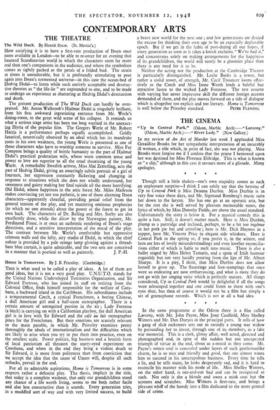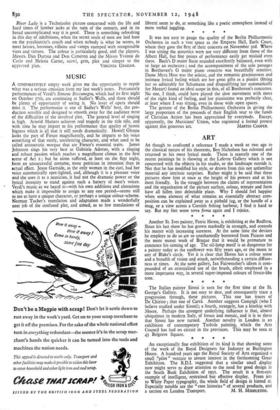THE CINEMA
6, Up In Central Park." (Odeon, Marble Arch)—" Larceny." (Odeon, Marble Arch.)—" River Lady." (New Gallery.) IN my review of An Act of Murder last week I applauded Miss Geraldine Brooks for her sympathetic interpretation of an incurably ill woman, a role which, in point of fact, she was not playing. Miss Brooks must forgive me if I confess that the praise I bestowed upon her was destined for Miss Florence Eldridge. This is what is known as " a slip," although in this case it savours more of a glissade. Many apologies.
Though still a little shaken—one's own stupidity comes as such an unpleasant surprise—I think I can safely say that the heroine of Up in Central Park is Miss Deanna Durbin. Miss Durbin is in very fine voice these days, and Mr. Sigmund Romberg's music suits her down to the larynx. She has one go at an operatic aria, but for the rest she is well served by pleasant memorable tunes, the lyrics of which, by Miss Dorothy Fields, are above the usual standard. Unfortunately the story is below it. For a musical comedy this is quite a feat. Still, it doesn't matter much. Here is Miss Durbin, plump as a partridge and inclined, perhaps, to be a bit too ingenue in her pork pie hat and crinoline ; here is Mr. Dick Haymes in a topper, here Mr. Vincent Price in elegant side whiskers. Here is Central Park in the spring or, if you prefer it, in the winter, and here are lots of lovely misunderstandings and even lovelier reconcilia- tions either of which is liable to melt into music. There is also a ballet staged by Miss Helen Tamaris, and a spate of Irish humour roguishly but not very lucidly pouring from the lips of Mr. Albert Sharpe. It is a pity, I think, that Miss Durbin does not allow herself to grow up. The flauntings and foot-stampings that once were so endearing are now embarrassing, and what is more they do not go with her singing voice which is perfectly mature. All things considered, Up in Central Park would be delightful if all the songs were telescoped together and one could listen to them with one's eyes shut, but then of course it would not be a film but simply a set of gramophone records. Which is not at all a bad idea.
In the same programme at the Odeon there is a film called Larceny, with Mr. John Payne, Miss Joan Caulfield, Miss Shelley. Winters and Mr. Dan Duryea in the principal parts. It tells of how a gang of slick racketeers sets out to swindle a young war widow by persuading her to invest, through one of its members, in a fake, war memorial. This is a sleek, glossy affair, well acted, directed and photographed and, in spite of the sudden but not unexpected triumph of virtue at the end, about as a-moral as they come. Mr. Payne's rotten soul is concealed under layers of such gentlemanlike charm, he is so nice and friendly and good, that one almost wants him to succeed in his unscrupulous business. Every time he tells a lie, and he tells many, he looks desperately sad, and it is hard to reconcile his manner with his mode of life. Miss Shelley Winters, on the other hand, is out-and-out bad and can be recognised as such. Not only is she a blonde and owns a mink coat but she screams and scratches. Miss Winters is first-rate, and brings a pleasant whiff of the bawdy into a film dedicated to the more genteel side of crime.
River Lady is a Technicolor picture concerned with the life and hard times of lumber jacks at the turn of the century, and in its broad uncomplicated way it is good. There is something refreshing in this day of inhibitions, when the secret souls of men are laid bare on the psychiatrist's couch and when nobody is what he seems, to meet heroes, heroines, villains and vamps stamped with recognisable vices and virtues. The colour is particularly good, and the players, Messrs. Dan Duryea and Don Cameron and the Misses Yvonne de Carlo and Helena Carter, scowl, grin, plot and simper to the



































 Previous page
Previous page